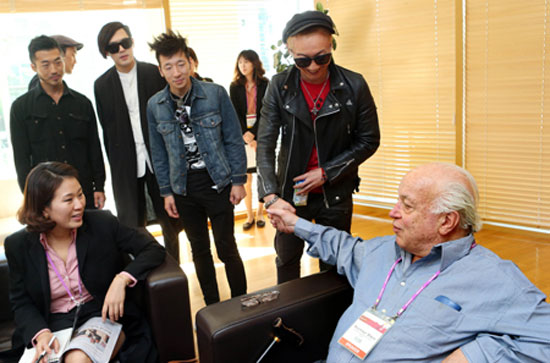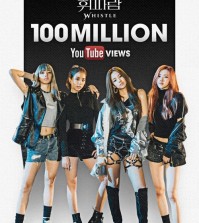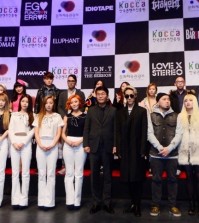- California Assembly OKs highest minimum wage in nation
- S. Korea unveils first graphic cigarette warnings
- US joins with South Korea, Japan in bid to deter North Korea
- LPGA golfer Chun In-gee finally back in action
- S. Korea won’t be top seed in final World Cup qualification round
- US men’s soccer misses 2nd straight Olympics
- US back on track in qualifying with 4-0 win over Guatemala
- High-intensity workout injuries spawn cottage industry
- CDC expands range of Zika mosquitoes into parts of Northeast
- Who knew? ‘The Walking Dead’ is helping families connect
No Brain Signs with Sire Records
Music biggies talk music, K-pop as MU:CON Seoul 2013 wraps up

Seymour Stein, right, vice-president of Warner Bros and Sire Records president, shakes hands with the leader of Korean rock band No Brain, after announcing his company will sign the band, at a press meeting held in GS XI-Gallery, near Hongik University in Seoul, Friday. / Yonhap
By Park Jin-hai
Seymour Stein, better known as the man who made Madonna into a global pop-icon, opened the last day of the world music market MU:CON Seoul 2013.
“There are only two categories in music– good and bad music. Go for good/great and don’t look for trends. Once there is a trend, it’s over and it’s too late to hop on,” said Stein, 71, Warner Bros vice-president and the Sire Records president, at GS Gallery in Hongdae, Seoul.
“No Brain is unique in performance. I think they have universal appeal,” said Stein, who has agreed with the rock band No Brain to produce an album. “They will be working with the producer Julian Raymond, who takes chances in music.”
The collaboration is expected to take place at the earliest in January.
Asked how he sees Korean content, Stein said that people always buy music because of the quality.
The band said that they were honored to work with Stein, who approached them after seeing them perform first at a music festival in Canada earlier this year.
“He has this habit of shaking his cane when he’s excited. We saw it twice so far through our two meetings and we are hoping to see it more when the album is released,” said Lee Seong-woo, No Brain’s main vocalist.
Stein said that Sire Records will produce the album, which will be distributed by Warner Brothers.
“It’s a good time to be Korean,” he said.
Yet at the same time, he said music should be the heart and soul of the people. “They say that imitation is the sincerest form of flattery, I say imitation is garbage.”
Pelle Lidell
Pelle Lidell, A&R Executive of Universal Music Publishing, who wrote songs for Korean artists such as Girls’ Generation, TVXQ and Super Junior, said K-pop can make it in Europe.
“Some 15,000 kids from Spain, Germany and Scandinavian countries knew every line of their idol’s songs. From that moment, I changed my mind that K-pop can actually make it in Europe,” said Lidell, recalling his experience at a SM Town Concert held in France a few years ago.
He added that what makes K-pop different is its extreme “artistry.” “There are a lot of European acts that can match best K-pop acts in choreography in dancing. In singing? Yes. But, not as a whole package,” he said. “I think that’s what makes K-pop really unique.”
Lidell mentioned “sheer prejudice” as the obstacle to K-pop’s overseas advancement. “The same way that friends of mine were prejudiced when Korean cars came into our market. The same people are now driving Korean cars. But, it took a while to accept that K-pop and Korean artists are well in class,” he said.
Asked about if the videos posted on YouTube will promote K-pop, he said it will increase prejudice. “Instead, K-pop should concentrate on quality songs, quality videos, great performances and most of all, great songs. It should stay away from ‘novelty traps,’” he said.
Robin Jenssen
Robin Jenssen, CEO of Dsign Music from Norway, from the songwriter and producer’s perspectives, said collaboration between writers is something that could push K-pop into foreign markets.
“Writing music in the Asian market mostly has been something they do on their own. A Writer, producer writes music on his own. You don’t collaborate with anyone.” He said, however, that it has now changed.
“A lot of Asian writers collaborate with U.S. or European song-writers,” Jenssen said. He said that by breaking down the boundaries and working together make it easier to understand what needs to be done to get into the U.S. or European market for Asian artists and vice versa for American and European artists,” he added.
Jenssen introduced “concept” as something new and happening in the Korean music industry. “For concept songs such as EXO’s Wolf, we have to visualize a video, or visualize a story or what is going to be. That is how they are packaged, too. Everything is part of a big concept. That is the trick,” he said.
Lindell also said this Korean way of ‘writers writing songs with choreography in mind’ is exceptional. “Instead of staying with the same format we used to like what tempo, key or what style, this and take it to a new level, and now everybody is making something totally new,” Jenssen added.













![일본 사도광산 [서경덕 교수 제공. 재판매 및 DB 금지]](http://www.koreatimesus.com/wp-content/uploads/2024/07/PYH2024072610800050400_P4-copy-120x134.jpg)


